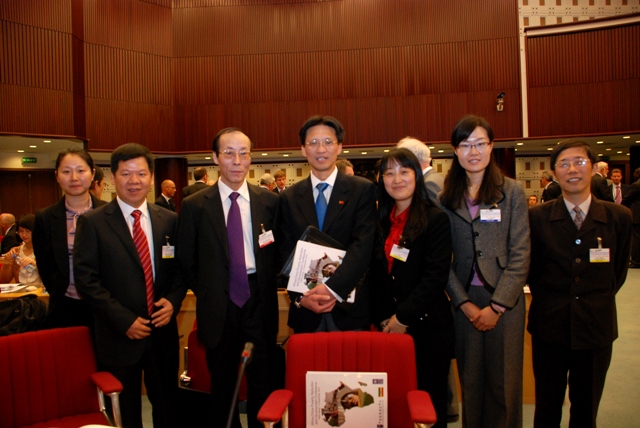 Image: Vice Minister Zheng Wenkai of China with his delegation and staff from UNDP China office at the Africa-China Poverty Reduction and Development Conference (Addis Ababa, Ethiopia 1-2 November 2010). Credit, creative commons licensed on Flickr by United Nations Development Programme.
Image: Vice Minister Zheng Wenkai of China with his delegation and staff from UNDP China office at the Africa-China Poverty Reduction and Development Conference (Addis Ababa, Ethiopia 1-2 November 2010). Credit, creative commons licensed on Flickr by United Nations Development Programme.
The Voice of America Horn of Africa service (Amharic, Tigrinya and Afan Oromo) asked me to comment on Nov. 24 on the 40th anniversary of the establishment of diplomatic relations between Ethiopia and China.
I noted that Emperor
Haile Selassie established the relationship 40 years ago with the blessing of the United States, which was itself in the process of improving ties with China.
Ethiopia-China ties experienced a setback after
Mengistu Haile Mariam took power in 1974 because Mengistu developed close ties with the Soviet Union at the height of the Sino-Soviet conflict. This led to cooler relations between Ethiopia and China. When the EPRDF replaced the Mengistu government in 1991, there began a significant improvement in Sino-Ethiopian ties that has continued to the present day.
Although the United States and European Union continue to have strong ties with Ethiopia, it could be argued that China has more significant economic links today with Ethiopia than either the United States or European Union.
China has made available significant low interest loans and is the major player in both road construction and developing the telecommunications network. The United States still offers more assistance, however, and all of it is grant aid.
Ethiopia’s exports to China increased from $7 million in 2002 to $81 million in 2008. On the other hand, its imports from China increased from $145 million in 2002 to $1.15 billion in 2008. This enormous Ethiopian trade deficit with China is not sustainable.
When asked what impact China was having on democracy in Ethiopia, I replied that both China and Ethiopia have a different view of democracy than does the United States and West generally. When looked at from the standpoint of the Western view of democracy, China obviously does not encourage Ethiopia to move in that direction.




